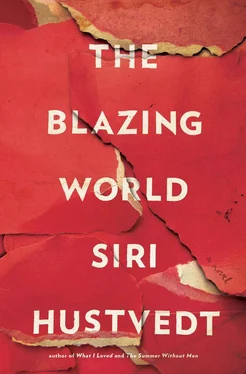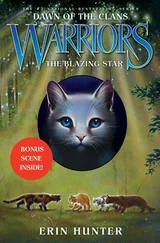Last night I saw them coming, one after the other, waiting in a long line outside the gallery and the maze, my maze. I wanted to throw back my head and howl, It’s mine! but I clenched my teeth. Dizzy, dissonant, aggrieved Harry, a ghost outside her own opening. I took my place in line for a while behind two prancing ninnies in shoes so high their knees wobbled as they stepped forward, and I listened to them carry on a long discussion on the merits of something called a “master cleanse” that involved lemonade and salt. Oh my God, Lindsay, five pounds in three days. Oh my God, that is so fantastic, oh my God.
Patrick L. accosted me about possible auction of the Klee. Just a rumor, Harriet? Vague odor of smoked salmon emanated from him. Under the streetlights, I noticed a pimple or maybe a hive on his cheek. He had gone through the maze already.
It’s great. Rune is a genius, a fucking genius .
I asked him if that wasn’t going too far.
You haven’t seen the show yet. You saw Banality of Glamour , didn’t you?
I nodded.
Well, this is even better . And then he leapt onto Felix, my buried better half. That is all he could think of to say. He saw me, thought Felix, thought widow, emitted loquacious stream of praise for dead husband. No one has really replaced Felix, not Burridge, certainly, as trendy and global as he is, and, by the way, as an afterthought, what was I up to these days, and lunch maybe? At the word lunch Patrick L. twinkled. I suddenly understood the verb. I nodded at him, my chin in motion. Why nod? I should have been shaking my head vigorously no, no, no. Did I smile? Oh God, did I smile? I hope I didn’t smile.
As I talked to Patrick L., I wondered why, why am I not like them? Why am I a foreigner? Why have I always been outside, pushed out, never one of them? What is it? Why am I always peering in through the window? I felt fault lines in my torso ready to split open. I thought of my punching bag in the studio, how good it felt to hit and hit again. I had an urge to punch him. In my mind, I saw him reel backward into the wall and collapse in the gutter.
I left the line and walked to the end of the block, and I watched. I knew Rune would be waiting for me to arrive, but I would not go in. Phinny and Marcelo bumped into me, dear Phinny, but he isn’t quite the same Phinny anymore, not my Phinny, not the man of the lodge, not my dancing, singing comrade. He’s lost to me now. He wanted me to come to dinner, but I said no. No, I said, no. I believe in no. I believe in a hard, resistant, diamantine no. No and no again. No, I will not. No and never and not. I prefer not to. I have grown sick to death of yes. Oh yes, I will. Yes, certainly, of course, yes, darling, yes, sweetheart. Yes, yes, yes. And she said yes.
And as they walked away, hand in hand, I felt as if I could cry, but I did not. No, not. I will not cry.
The writers must write and the critics critique and the reviewers review and the pissers piss, and they shall.
My time has come, and whatever they say — the mostly mediocrities — is not the point. HOW THEY SEE is all that matters, and they will not see me.
Until I step forward.
February 25, 2003
It is so easy for Rune to shine. Where does that effortlessness come from? He is so light. I am earthbound, a Caliban to his Ariel. And I must watch his weightless flights over my head, while I lurk underground with brown thoughts that roil my guts. “Himself is his own dungeon.”I I, Harriet Burden, am a machine of vindictiveness and spite. My whole body churns as I gorge on the reviews and notices and commentaries about the brilliant Rune’s coup. Their heads are turned. The man who has written the review in The Gothamite , Alexander Pine, does not know he has written about me, not Rune. He doesn’t know that the adjectives muscular, rigorous, cerebral can be claimed by me, not Rune. He doesn’t know he is a tool of my vengeance. No one rejoices more in revenge than women, wrote Juvenal. Women do most delight in revenge, wrote Sir Thomas Browne. Sweet is revenge, especially to women, wrote Lord Byron. And I say, I wonder why, boys. I wonder why.
I. John Milton, “Comus, A Mask” (388).
Harriet Burden Notebook O

Come over, Rune said on the telephone yesterday. He had something to show me, part of “our act,” and he gave me a clue: “your happiness.” And we made the date for four o’clock today, and I knew it was time to plan the revelation because there had been enough yakking in print about the show, and yes, coming out would make me happy. That was yesterday. Today you drove into Tribeca, and you see yourself now, smiling as you leave the elevator, buoyant because the whole story is almost over, and you and your coconspirator are about to let them have it, and you think to yourself, I will levitate like my masked dancer, rise up from the earth like a phoenix. You really couldn’t have taken much more of it, anyway, you think to yourself, and you sat down, and he asked you if the clue had led to a solution, and you said to him, Yes, it’s time for me to burst into bloom, to find my happiness. It’s time to tell everyone. You explained that the Open Eye piece will be published as a letter in the next issue, that it gave you a delicious pleasure just to think of it, and then you thanked him. You thanked him for being part of it. You thanked him for letting you “wear” him. You leaned over and patted his hand, and you smiled again like a goddamned idiot. You smiled.

And he lit a cigarette and looked at you. He smoked and jiggled his knee and licked his teeth, and then he inserted a DVD into the television. I want you to see this, he said, and don’t say I didn’t give you a clue, because I did.
I saw Felix and stopped breathing for several seconds.
I saw Felix and Rune.
I saw them beside each other on a sofa in a curiously empty room — nothing on the wall behind them.
And I said, Why?
Just watch, he said to me.
I shook my head back and forth. This is what happened, wasn’t it? I felt shocked. And I was afraid. I didn’t want to see the two of them, but I couldn’t turn away. I watched them sitting on a sofa in an empty room.
I watched Felix, who had been resurrected on film. He wasn’t wearing a jacket, just a pale gray shirt and the green-gray Hermès tie his mother had given in, the one he dripped salad dressing on at a dinner that was held at the Met, the one that couldn’t be saved by the cleaners, and I remembered the flowers on the table and the place cards and my boredom that evening at the museum. What year was that? I asked myself desperately. After that dinner, he couldn’t wear the tie again. I remembered that the two men on either side of me turned their backs to talk to whomever, and I was left alone with my internal narrator wondering why I had come. I looked into the eyes of my dead husband on the film and at his smoothly shaven chin and at the gray hairs near his forehead and tried to remember when his mother had given him the tie, but I couldn’t. His hair had white in it, but later, later his hair would turn all white.

I waited, full of dread, for something to happen, but the two men did nothing. They stared straight ahead into the camera, and then, after maybe a minute had ticked by, they exchanged a smile, and turned back to face the camera.
Had it been an intimate smile?
Читать дальше















